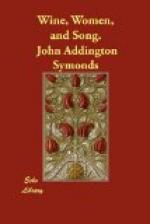Down the flowery greenwood
glade
As I chanced to
wander,
From bright eyes a serving-maid
Shot Love’s
arrows yonder;
I for her, ’mid all
the crew
Of the girls of
Venus,
Wait and yearn until I view
Love spring up
between us.
Another lyric of complicated rhyming structure introduces a not dissimilar motive, with touches that seem, in like manner, to indicate its German origin. It may be remarked that the lover’s emotion has here unusual depth, a strain of sehnsucht; and the picture of the mother followed by her daughter in the country-dance suggests the domesticity of Northern races.
AT THE VILLAGE DANCE.
No. 22.
Meadows bloom, in Winter’s
room
Reign the Loves
and Graces,
With their gift of buds that
lift
Bright and laughing
faces;
’Neath the ray of genial
May,
Shining, glowing,
blushing, growing,
They the joys
of spring are showing
In their manifold array.
Song-birds sweet the season
greet,
Tune their merry
voices;
Sound the ways with hymns
of praise,
Every lane rejoices.
On the bough in greenwood
now
Flowers are springing,
perfumes flinging,
While young men
and maids are clinging
To the loves they scarce avow.
O’er the grass together
pass
Bands of lads
love-laden:
Row by row in bevies go
Bride and blushing
maiden.
See with glee ’neath
linden-tree,
Where the dancing
girls are glancing,
How the matron
is advancing!
At her side her daughter see!
She’s my own, for whom
alone,
If fate wills,
I’ll tarry;
Young May-moon, or late or
soon,
’Tis with
her I’d marry!
Now with sighs I watch her
rise,
She the purely
loved, the surely
Chosen, who my
heart securely
Turns from grief to Paradise.
In her sight with heaven’s
own light
Like the gods
I blossom;
Care for nought till she be
brought
Yielding to my
bosom.
Thirst divine my soul doth
pine
To behold her
and enfold her,
With clasped arms
alone to hold her
In Love’s holy hidden
shrine.
But the theme of the dance is worked up with even greater elaboration and a more studied ingenuity of rhyme and rhythm in the following characteristic song. This has the true accent of what may be called the Musa Vagabundula, and is one of the best lyrics of the series:—
INVITATION TO THE DANCE.
No. 23.
Cast aside dull books and thought;
Sweet is folly, sweet is play:
Take the pleasure Spring hath brought
In youth’s opening holiday!
Right it is old age should ponder
On grave matters fraught with care;
Tender youth is free to wander,
Free to frolic light as air.
Like a dream our prime is flown,
Prisoned in a study:
Sport and folly are youth’s own,
Tender youth and ruddy.




